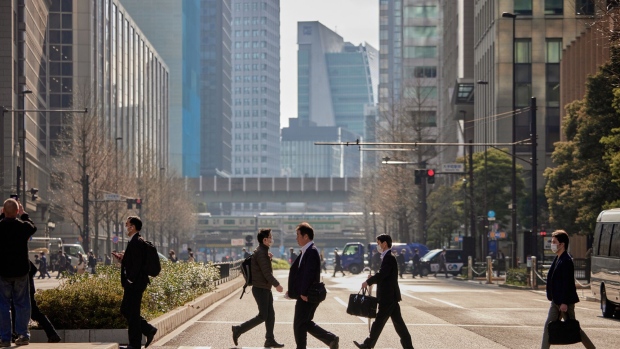Jan 24, 2024
Japan’s Unions Amplify Wage Hike Calls as Negotiations Kick off
, Bloomberg News

(Bloomberg) -- Japanese union leaders stepped up their campaign to persuade companies to come through with ambitious wage increases as annual pay negotiations with corporations kicked off.
“This year’s wage talks will be a critical moment in the transition to an economy with steadily rising wages and prices, and the biggest challenge is to share awareness throughout society,” Tomoko Yoshino, leader of the Japanese Trade Union Confederation, known as Rengo, said at a seminar on Wednesday. “We would like to focus on three key points: price negotiations, costs shifting to prices, and improvement of the working environment.”
Yoshino’s latest effort to rally support for better pay comes as the Bank of Japan continues to cite wages as a crucial factor that will determine whether a virtuous wage-price cycle can be achieved. BOJ Governor Kazuo Ueda said Tuesday the degree of certainty for hitting the bank’s price target is still rising gradually.
The governor also said that while he’s heard positive sounds from some companies regarding their pay plans, it’s still not clear how high or how widespread the trend toward higher wages will go.
Japan’s big firms are set to offer their unions wage hikes of 3.85% on average this year, the biggest gain in 31 years, according to a survey of 37 economists conducted Dec. 25-Jan. 9 by Japan Center for Economic Research. Last year’s wage talks showed that smaller firms lag their bigger counterparts in committing to aggressive increases.
“The spread of structural wage increases to smaller- and medium-sized companies is indispensable,” Masakazu Tokura, head of Japan’s biggest business lobby Keidanren, said in a video message.
Rengo’s first tally in mid-March of 2023 reflected outcomes of pay talks with larger companies, with an average 3.8% hike. That average dropped to 3.58% in July after results from more small and medium-sized enterprises were factored in.
Whether smaller firms can pass on rising production costs to customers via higher prices will be a key issue in wage talks, the leaders noted at the forum.
Some 35% of 832 small and medium-sized companies aren’t planning a wage hike, with the majority of those firms citing a lack of funds as the reason, according to a survey conducted earlier this month by Johnan Shinkin Bank and Tokyo Shimbun. Only about 15% of the respondents said they managed to fully pass higher costs on through higher prices, the report said.
“We are planning to confirm whether member companies are firmly passing on costs via prices as one initiative specific to this year,” said Akihiro Kaneko, president of the Confederation of Japan Automobile Workers’ Unions (JAW). The car workers’ union is seeking wage increases comparable to the targets proposed by their umbrella groups, including Rengo, which called for wage increases of 5% or more.
Katahiro Yasukochi, chairman of the Japanese Association of Metal, Machinery and Manufacturing Workers or JAM, said that despite gains in small businesses’ productivity, they haven’t been able to make money due to their inability to pass costs onto customers. “The lack of progress in passing costs on to customers via price increases in Japan is preposterous from a global perspective,” Yasukochi said.
©2024 Bloomberg L.P.


